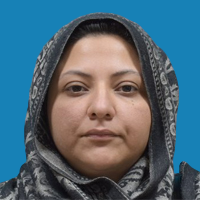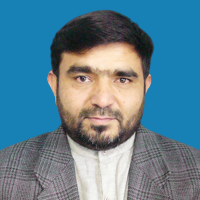
PROFILE SUMMARY
-
Dr. Sayyed Muhammad Mehdi Raza Naqvi holds a Ph.D. in Management Sciences from Muhammad Ali Jinnah University, Islamabad. He also completed his Master’s in Science (Management Sciences) from the same university and earned another Master’s degree in Economics from Punjab University, Lahore, specializing in Econometrics and Human Capital Planning. Presently, he holds the position of Head of the Department of Management Sciences, serves as the Director of the Jinnah Business Research Center, and fulfills the role of Editor-in-Chief for the Jinnah Business Review, a research journal of the Faculty of Management and Social Sciences at Capital University of Science and Technology. He is with 29 years of experience encompassing teaching, research, training, coaching & mentoring, consulting, management, and strategic planning. He is a distinguished professor, trainer, and consultant specializing in Strategic Management, Research Methodology, Conflict and Negotiation, and Organization Theory. He is with over 30 papers published in esteemed academic journals. Additionally, he has successfully supervised 13 PhD candidates and nearly 100 MS theses.
| QUALIFICATION | |||
| PhD | Human Resource Management | Muhammad Ali Jinnah University, Islamabad | 2012 |
| MS | Human Resource Management | Muhammad Ali Jinnah University, Islamabad | 2006 |
| MSc | Econometrics, Economics of Population and Manpower | Punjab University, Lahore, Pakistan | 1989 |
-
TEACHING EXPERIENCE Professor Capital University of Science and Technology (CUST), Islamabad Since – 2023 Associate Professor Mohammad Ali Jinnah University, Islamabad 2013-2022 Assistant Professor Mohammad Ali Jinnah University, Islamabad 2006 – 2013 Associate Professor Punjab Group of Colleges 2003 – 2006 Assistant Professor Punjab Group of Colleges 1996 – 2003
-
MANAGEMENT EXPERIENCE HoD Capital University of Science and Technology (CUST), Islamabad Since – 2024 Vice Principle Punjab College of Commerce, 6th Road, Rawalpindi 1995 – 2006
| MEMBERSHIP OF PROFESSIONAL BODIES | |||
| HRDN | Professional Member of HRDN Since 2008 | ||
| RESEARCH AREAS / INTERESTS | |||
| 1. | High Performance Work Systems | ||
| 2. | Employee (voice, Silence, greed) | ||
| 3. | Employees’ Attitudes and Behaviors | ||
| 4. | Conflict and Negotiation | ||
-
RESEARCH SUPERVISION 1. PhD Family Dynamics and Buying Decision for Meat: Development & Testing of Model for Pakistani Consumer Market 2. PhD Positive Psychological States and Innovative Work Behavior: The Role of Relational Leadership 3. PhD The Link between Person-Environment Misfit and Employee Greed: An Exploration of Mediation and Moderation 4. PhD Tuberculosis (TB) Related Stigma; A Conceptual Framework and Workplace Implications 5. PhD Impact of employee development on OCB and employee turnover intentions 6. PhD Voice behavior with its antecedents and outcomes through the lens of proactive behavior theory 7. PhD The effect of employee attitude, supervisors’ attitude, and communication opportunities on employee silence, mediated by employee intentions to remain silent. The theory of planned behavior perspective. 8. PhD Evaluation of nurse’s creative performance and prosocial behavior as outcome of experience compassion at workplace; an application of effective events theory 9. PhD Impact of Supervisory and Coworker Communication Apprehension on Newcomers’ Relationship, Role-related and Adjustment Outcomes, the Mediating and Moderating Mechanisms: An Uncertainty Reduction Theory Perspective 10. PhD Task communication and training evaluation 11. PhD Hatred as an Affective Outcome of Relationship Conflict: A Moderated, Mediating Study in Public Sector of Pakistan 12. PhD Job demands-Resources Perspective 13. MS Impact of emotional intelligence on project success 14. MS Impact of effective team training on project performance 15. MS Impact of despotic leadership on employee instigate work incivility through interpersonal conflict with moderation of self-efficacy 16. MS Impact of Inclusive Leadership on Innovative Work Behavior with Mediating Role of Employee Volunteering and Moderating Role of Effective Trust 17. MS Impact of passive leadership on workplace incivility with mediating role of emotional labor and moderating role of power distance 18. MS Impact of Servant Leadership on Employee Performance with Mediating Role of Trust in Leadership and Moderating Role of Power Distance 19. MS Impact Of Despotic Leadership on Employee Performance With The Mediating Role Of Emotional Exhaustion And Moderating Role of Project Culture. 20. MS Impact of Workplace Fun on Project Task Performance with The Mediating Role of Employee Engagement and Moderating Role of Positive Humor 21. MS The Relation between Despotic Leadership and Psychological Well-being 22. MS The Impact of Empowering Leadership on Employee Creativity with the mediating role of Self-Efficacy and the moderating role of Proactive Personality 23. MS Impact of Workplace Bullying on Employee Cynicism through Emotional Labor and with Moderating Role of Core Self-Evaluation 24. MS Cyber Bullying and its emotional impact on Employees Performance with mediating role of Psychological Distress and moderating role of Management Support 25. MS Impact of tyrannical leadership on employee withdrawal behavior with mediation of emotional exhaustion and moderation of employee workplace ostracism 26. MS Impact of Presenteeism on productivity loss of Employees with the Mediating Role of Burnout and Moderating Role of Self-Efficacy: A study on Teachers In educational sector of Pakistan 27. MS Impact of Knowledge sharing on employee performance with mediating role of intention to share and moderating role of project commitment 28. MS Impact of Workplace Bullying on Work Family Conflict: Mediating Role of Emotional Exhaustion and Moderating Role of Neuroticism 29. MS Mediating role of switching barriers in determining service quality and moderating role of customer satisfaction on customer loyalty 30. MS Impact of servant leadership on project success with mediating role of team skills and moderating role of power distance 31. MS Who is responsible for Employee Deviance? Despotic Leadership in relation to moral disengagement of employees 32. MS Impact of Aversive Leadership on Followers Organization Citizenship Behavior; Mediating role of Perceived Justice and Moderating role of Trust in Leadership 33. MS Impact Of Authentic Leadership on Team Performance with the mediating role of Creative Behavior and moderating role of Team Communication Quality 34. MS Shared leadership: The moderating effect of LMX differentiation and the mediating role of team monitoring on perceived team performance 35. MS Impact of Job Crafting on Job Performance: Mediating Role of Work Engagement with Openness to Experience as a Moderator between Job Crafting and Work Engagement 36. MS The effect of knowledge absorption on project performance with mediating role of innovation capability and moderating role of organizational culture 37. MS Impact of Cyber Loafing on Employee Job Performance: The Mediating Role of Employee Job Attitude and Moderating Role of Conscientiousness 38. MS Workplace Bullying and Innovative Work Behavior: The Mediating role of Perceived Organizational Support and Moderating role of Openness to Experience 39. MS Impact of ethical leadership on job performance with mediating role of employee trust and moderating role of psychological empowerment
| SR. | JOURNAL PUBLICATIONS | YEAR |
|---|---|---|
| 1 | A. Khan, S. M. M. Naveed, S. Naveed, F. Sheraz, S. M. M. R. Naqvi and S. H. Awan, “Examining the role of instructional leaders and their effects on teacher performance and organizational citizenship behavior in the educational sector of Pakistan: Teacher’s self-efficacy as a mediating factor,” Multicultural Education, vol. 9, no. 6, 2023. | 2023 |
| 2 | S. S. N. Arooj, S. M. M. R. Naqvi, “Hatred as an affective outcome of relationship conflict: A moderated mediated study from the public sector of Pakistan,” Journal of Southwest Jiaotong University, vol. 58, no. 2, 2023. | 2023 |
| 3 | M. Irshad and S. M. M. R. Naqvi, “Impact of team voice on employee voice behavior: role of felt obligation for constructive change and supervisor expectations for voice,” in Evidence-based HRM: A Global Forum for Empirical Scholarship, vol. 11, no. 3. Emerald Publishing Limited, pp. 335–351, 2023. | 2023 |
| 4 | U. e. Rubbab, S. M. M. R. Naqvi, M. Irshad, and R. Zakariya, “Impact of supervisory delegation on employee voice behavior: role of felt obligation for constructive change and voice climate,” European Journal of Training and Development, vol. 47, no. 7/8, pp. 769–787, 2023. | 2023 |
| 5 | M. U. A. Baig and S. M. M. R. Naqvi, “Why trainees evaluate the same trainer differently? Examining a dual-process model of training effectiveness,” European Journal of Training and Development, vol. 47, no. 1/2, pp. 1–23, 2023. | 2023 |
| 6 | R. Zakariya and S. M. M. R. Naqvi, “Leader instigated task conflict and its effects on employee job crafting; the mediating role of employee attributions,” PLOS ONE, vol. 17, no. 12, p. e0278329, 2022. | 2022 |
| 7 | A. A. Qureshi and S. M. M. R. Naqvi, “The antecedents, correlates, and consequences of employee silence,” Pakistan Social Sciences Review, vol. 6, no. 2, pp. 1057–1065, 2022. | 2022 |
| 8 | Q. Hayat, S. M. M. R. Naqvi et al., “Greed: Theoretical, religious and business perspectives,” Journal of Islamic Business and Management, vol. 11, no. 2, 2021. | 2021 |
| 9 | A. Qureshi, S. M. M. R. Naqvi, “Employee reticence: Development and validation of its scale,” Humanities Social Sciences Reviews, vol. 9, pp. 453–463, 04 2021. | 2021 |
| 10 | A. Khan, S. M. M. R. Naqvi et al., “Does perceived organizational support moderate in the relationship between internal tuberculosis stigmatized individuals and deviant workplace behavior of employees through mediating role of self-esteem,” Elementary Education Online, vol. 20, no. 2, pp. 975–975, 2021. | 2021 |
| 11 | S. M. M. R. Naqvi, U-e-Rubbab, “Employee voice behavior as a critical factor for organizational sustainability in the telecommunications industry,” PLOS ONE, vol. 15, no. 9, p. e0238451, 2020. | 2020 |
| 12 | Q. Hayat and S. M. M. R. Naqvi, “Antecedents and Consequences of Employee Greed: An Empirical Examination,” Global Regional Review, vol. 04, no. 3, pp. 1-11, 2019. | 2019 |
| 13 | A. Khan, S. M. M. R. Naqvi, M. I. Qureshi, and U. Sohail, “Disclosure tuberculosis stigmatized identities and its workplace implications in Pakistan,” The European Proceedings of Social & Behavioural Sciences, vol. 62, no. 01, pp. 1-539, 2019. | 2019 |
| 14 | A. Khan and S. M. M. R. Naqvi, “Anticipated tuberculosis stigmatized identities and deviant workplace behavior: A moderated mediated model in Pakistan,” Global Regional Review, vol. 4, no. 1, pp. 87–95, 2019. | 2019 |
| 15 | B. Javed, S. M. M. R. Naqvi, A. K. Khan, S. Arjoon, and H. H. Tayyeb, “Impact of inclusive leadership on innovative work behavior: The role of psychological safety,” Journal of Management & Organization, vol. 25, no. 1, pp. 117–136, 2019. | 2019 |
| 16 | A. Khan and S. M. M. R. Naqvi, “Experience/ enacted tuberculosis stigmatized employees and their deviant workplace behaviors: A mediated moderated model in Pakistan,” Journal of Managerial Sciences, vol. 12, no. 04, pp. 278-286, 2018. | 2018 |
| 17 | A. Khan and S. M. M. R. Naqvi, “The impact of internalized stigma at workplace through interlinking mechanism of self-esteem of tuberculosis patients in pakistan,” Journal of Managerial Sciences: A Quarterly Research Journal, vol. 11, no. 3, pp. 323–342, 2017. | 2017 |
| 18 | Q. Hayat and S. M. M. R. Naqvi, “Job strain, employee greed, and employee envy: moderating role of self-monitoring in the banking sector of pakistan,” Journal of Managerial Sciences, vol. 11, pp. 03–24, 2017. | 2017 |
| 19 | B. Shabbir and S. M. M. R. Naqvi, “Impact of workload and job complexity on employee job performance with the moderating role of social support and mediating role of job stress: A study of travel agencies in rawalpindi, islamabad and ajk,” Journal of Accounting Marketing, vol. 6, no. 1, 2017. | 2017 |
| 20 | J. K. Khattak and S. M. M. R. Naqvi, “Impact of consumer beliefs on beef buying intention in pakistan: An application of the theory of planned behavior,” Abasyn University Journal of Social Sciences (AJSS), vol. 9, no. 2, 2016. | 2016 |
| 21 | F. Hanif and S. M. M. R. Naqvi, “The role of employee engagement in work related outcomes,” Advances in Economics and Business, vol. 3, pp. 204–214, 2015. | 2015 |
| 22 | S. M. M. R. Naqvi and S. Bashir, “It-expert retention through organizational commitment: A study of public sector information technology professionals in pakistan,” Applied Computing and Informatics, vol. 11, no. 1, pp. 60–75, 2015. | 2015 |
| 23 | F. Hanif and S. M. M. R. Naqvi, “Analysis of work family conflict in view of nurses, in health sector of pakistan,” International Journal of Gender and Women’s Studies, vol. 2, no. 4, pp. 103–116, 2014. | 2014 |
| 24 | O. Farooq, S. M. M. R. Naqvi, M. Payaud, D. Merunka, and P. Valette-Florence, “The impact of corporate social responsibility on organizational commitment: Exploring multiple mediation mechanisms,” Journal of Business Ethics, vol. 125, pp. 563–580, 2014. | 2014 |
| 25 | S. M. M. R. Naqvi, M. Ishtiaq, N. Kanwal, M. U. Butt, and S. Nawaz, “Impact of gender diversity on team performance: The moderating role of organizational culture in telecom sector of pakistan,” Asian Journal of Social Sciences & Humanities, vol. 2, no. 4, pp. 228–235, 2013. | 2013 |
| 26 | S. M. M. R. Naqvi, N. Kanwal, M. Ishtiaq, and M. Ali, “Impact of job autonomy on organizational commitment: Moderating role of job satisfaction in tobacco industry of pakistan,” Far East Journal of Psychology and Business, vol. 12, no. 5, pp. 57–72, 2013. | 2013 |
| 27 | S. M. M. R. Naqvi, M. Ishtiaq, N. Kanwal, and M. Ali, “Impact of job autonomy on organizational commitment and job satisfaction: The moderating role of organizational culture in fast food sector of pakistan,” International Journal of Business and Management, vol. 8, no. 17, p. 92, 2013. | 2013 |
| 28 | S. M. M. R. Naqvi, M. Ishtiaq, N. Kanwal, M. Ali, and S. Inderyas, “Impact of Corporate Social responsibility on Brand image in Different FMCGs of Pakistan,” Interdisciplinary Journal of Contemporary Research In Business, no. 01, pp. 79, 2013. | 2013 |
| 29 | S. M. M. R. Naqvi, F. Malik, and Q. Mahmood, “The impact of promotions, recognition, autonomy and pay incentives on job satisfaction: A case of banking sector employees in pakistan,” European Journal of Business Management, vol. 5, no. 5, pp. 187–193, 2013. | 2013 |
| 30 | S. Jawaid, A. Rajput, and S. M. M. R. Naqvi, “Impact of celebrity endorsement on teenager’s impulsive buying behavior,” Interdisciplinary Journal of Contemporary Research in Business, vol. 4, no. 10, pp. 1071–1080, 2013. | 2013 |
| 31 | S. M. M. R. Naqvi, Q. Mahmood, A. A. Minhas, J. Khattak, and F. Malik, “Impact of organizational career management activities on organizational commitment: A case of IT companies of Pakistan,” Scholarly Journal of Business Administration, vol. 3, no. 1, pp. 7–11, 2013. | 2013 |
| 32 | S. M. M. R. Naqvi, M. Ishtiaq, N. Kanwal, and S. Inderyas, “Impact of gender diversity on organizational performance in telecom sector of Pakistan: The moderating role of organizational culture,” Scottish Journal of Arts, Social Sciences and Scientific Studies, vol. 7, no. 1, pp. 32–49, 2012. | 2012 |
| 33 | S. M. M. R. Naqvi and S. Nadeem, “Impact of high performance practices system on motivation,” Interdisciplinary Journal of Contemporary Research In Business, no. 8, pp. 197, 2011. | 2011 |
| 34 | A. Rahman, S. M. M. R. Naqvi, and M. I. Ramay, “Measuring turnover intention: A study of IT professionals in Pakistan,” International Review of Business Research Papers, vol. 4, no. 3, pp. 45–55, 2008. | 2008 |
| 35 | M. Ramay, S. Aftab and S. M. M. R. Naqvi, “Please Let Me Do My Job,” The European Case Clearing House, ECCH reference no. 407-046-1 / 407-046-8, Article in Press, No: 1, 2007. | 2007 |
| 36 | M. Ramay, G. Khalid and S. M. M. R. Naqvi, “Myopia in Human Resource Practices,” The European Case Clearing House, ECCH reference no. 407-017-1 / 407-017-8, (Article in Press) No: 1, 2007. | 2007 |
| 37 | S. M. M. R. Naqvi, and M. Ramay, “We Don’t Hate Each Other,” The European Case Clearing House, ECCH: reference: 707-011-1 / 707-011-8, No: 1, 2007. | 2007 |
| 38 | S. T. Hijazi and S. M. M. R. Naqvi, “Factors affecting students’ performance,” Bangladesh e-journal of Sociology, vol. 3, no. 1, 2006. | 2006 |
| SR. | CONFERENCE PUBLICATIONS | YEAR |
|---|---|---|
| 1 | J. Khattak, S. M. M. R. Naqvi and M. J. Khattak, “Buying meat for family in the collectivist culture: An application of the theory of planned behavior,” NUML International Journal of Business & Management, vol. 12, no. 1, pp. 145–163, 2017. | 2017 |
| 2 | R. Kosar, T. Ahmed, and S. M. M. R. Naqvi, “Impact of emotional labor strategies on employee burnout mediating role of emotional dissonance and moderating role of workplace social support,” Economic and Social Development: Book of Proceedings, p. 144, 2016. | 2016 |
| 3 | R. Kosar and S. M. M. R. Naqvi, “Psychological empowerment and employee behaviors employee engagement as mediator and leader-member exchange as moderator,” Economic and Social Development: Book of Proceedings, p. 485, 2016. | 2016 |
| 4 | S. M. M. R. Naqvi, A research paper “High performance HR practices as a source of competitive advantage in banking sector” accepted in International Engineering & Management Conference 2012. 24-25 October 2012. | 2012 |
| 5 | S. M. M. R. Naqvi, A research paper “The Impact of high performance work practices system on Organizational performance and motivation” accepted in 27th EGOS Colloquium, University of Gothenburg, Sweden. 06-09 July, 2011. | 2011 |
| 6 | S. M. M. R. Naqvi, A research paper “The Impact of Compensation, Supervisor Support, Training & Development on Organizational Commitment of IT Professionals in Pakistan” is accepted in International Colloquium on Business and Management conference in Bangkok 19-22nd November, 2007. | 2007 |
| 7 | S. M. M. R. Naqvi, A research paper “Impact of socio-economic factors on students’ academic performance” is accepted in 2nd International Symposium by PEP Foundation Inc. USA on “Issues in Higher Education in Pakistan Under Graduate Degree: The Weakest Link”. University of Arid Agriculture, Rawalpindi, Pakistan. 11-13 November, 2006. | 2006 |



































































































































































































































































